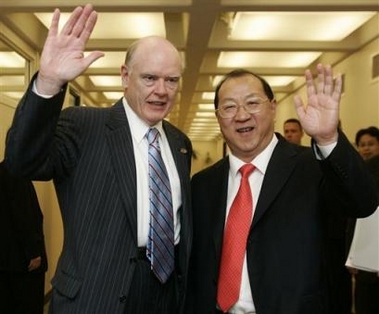|
China pursuing independent approach to currency reforms
(AP)
Updated: 2005-09-25 09:01
Chinese Finance Minister Jin Renqing stressed Saturday that Beijing is
adopting "an independent and responsible" approach to its currency reforms.
In addressing the annual meetings of the 184-nation International Monetary
Fund and its sister organization the World Bank, Jin said with the country's
economic growth, "China's economic policies have attracted a lot of attention,
especially regarding the exchange rate policy."
"I would like to take this opportunity to emphasize that the Chinese
government has been consistently pursuing an independent and responsible policy
approach in its exchange rate regime," he said.

China's Finance Minister Jin Renqing, right,
is welcomed by U.S. Treasury Secretary John Snow for private talks at
International Monetary Fund Headquarters in Washington, Saturday, Sept.
24, 2005.[AP] | China has long been under
international pressure to loosen its tightly controlled exchange rates. In the
U.S., manufacturers and politicians blame an undervalued Chinese currency for
the United States' soaring trade deficit and contend the situation could disrupt
the world economy.
On July 21, China announced that it was allowing its currency _ the yuan, but
also called renminbi _ to appreciate by 2.1 percent against the U.S. dollar and
would adopt a policy of linking its currency to a basket of foreign currencies.
Under that system, the yuan was allowed to rise or fall 0.3 percent against the
dollar and a wider 1.5 percent against non-dollar currencies, such as the yen
and the euro.
On Friday, shortly before Jin and central bank governor Zhou Xiaochuan were
to attend as observers the meeting of finance ministers and central bankers from
the Group of Seven leading industrialized nations, China said it would let the
yuan move up or down 3 percent against non-dollar currencies, while leaving the
yuan-dollar band unchanged.
Jin didn't indicate in his speech on Saturday whether the Chinese government
will make any further adjustment of the Chinese currency.
"The reformed exchange rate regime and more flexible renminbi exchange rate
have strengthened the government's ability to manage the macro economy and
improved the prospect of rapid, sustained and balanced growth," he said.
|